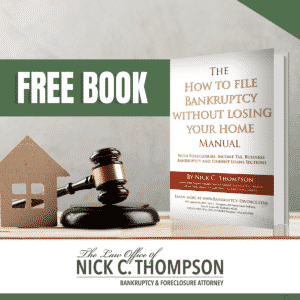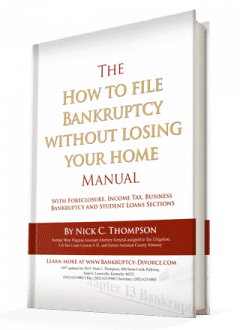In Western Kentucky, when your Chapter 13 plan pays less than 100%, by May 15th of each year, you must turn over a budget, copies of your tax returns, and the income tax refund to the Trustee. This is a requirement for the last four years of a five-year plan. Also, you cannot keep the Federal Child Tax Credit. However, you can keep the Earned Income Credit (EIC) and the amount paid to prepare taxes. If you receive a refund from the Feds and owe the state, you may deduct from one and pay the other. But, you can’t pay your taxes ahead. Look at your schedule I and J you filed with the court. It should be similar to your current budget. If your wages increase by 10%, your food probably increased by 10%. Here are the Western Kentucky Chapter 13 bankruptcy rules you need to know.
Western Kentucky Chapter 13 Bankruptcy Rules You Must Know
- Your creditors file claims. We file a schedule of allowed claims, which are paid if you don’t object to a claim. You should review claims with us about 60 days after the 341 hearing. Do this or you might pay debts you don’t owe.
- If your claims exceed what you planned, you may have to increase payments or lower the plan percentage based on the claims that are filed.
- Your 341 hearing takes place 30 days after you file. You must bring your photo id, social security card, and first payments to the court. If it is two months since you filed, you owe two payments. You must pay these or risk having your case dismissed. So, the day you file, remember that you owe your first plan payment and mortgage payment.
- If you had a prior case within the last six months, then, talk to your attorney for the need to file a motion to extend the automatic stay or impose the stay if you file two or more cases.
⎆ Western Kentucky Chapter 13 bankruptcy regulations.
- Where you have a consumer auto loan and it is over 910 days old, you can pay the value of the auto to the lender as secured and the remainder as unsecured. If the auto was for business or the loan refinanced the vehicle, or the loan had an additional purpose you don’t have to wait 910 days to cram down the loan.
- When your income is less than average, you can get a 36-month payment plan. But during that time, payments might go up because of secured and secured and priority expenses. Plans that pay 100%, might have a 24, 12, or 1-month plan. As always, the requirement is to use your best efforts to repay. Interestingly, Judge Lloyd does not review 70% or more Chapter 13 plans. Also, Judges Fulton or Stout do not normally review the 50% and higher plans. You can pay off a plan early but not before 36 months unless you repay 100%. You also have access to Early Hardship Discharges if you become disabled or otherwise can’t repay due to no fault of your own.
- If you have a judicial lien that you need to avoid, tell us at the start! For instance, if someone is suing you, you might have a judicial lien against your home. It’s an extra cost to avoid this lien. But if you don’t pay the $500 to delete this lien now, you might have to pay thousands later to remove it. Then, you must wait 30 days for removal which delays a home mortgage or closing.
- If your second or third mortgage has no equity, file a motion to strip the second mortgage at the start of the case. However, if you don’t do this, the mortgage survives. Interestingly, stripping might pay for your Chapter 13 costs.
⎆ Western Kentucky Chapter 13 bankruptcy plan considerations.
- Why payroll deduct the plan payments? Remember, your employer can be sued for discrimination if they fire or otherwise punish you for filing Chapter 13. Moreover, if the payments are not deducted you are less likely to finish your Chapter 13 successfully.
- Attorneys are all paid the same fee. Of course, you can hire a less expensive or a lawyer with less experience. However, the court pays the same $3,750 to whatever attorney you hire.
- If it doesn’t work out, you can always dismiss your Chapter 13. However, you may or may not be able to dismiss Chapter 7. But, you can lose property in Chapter 7. Conversely, people don’t lose property in Chapter 13 unless they fail to pay for it. You can also convert to Chapter 7 if you meet the income and other guidelines for a 7.
- Sometimes your income goes down, expenses go up, or you find yourself out of work. In such situations, it is possible to lower or suspend plan payments. But, you often must make it up later. Then, there is a floor the payment can’t go below. Additionally, you have to pay the required secured and priority expenses catching up on a mortgage, or paying priority taxes.
⎆ Western Kentucky Chapter 13 bankruptcy rules and restrictions.
- Expect to get rid of your expensive telecommunication leases and replace them with less expensive alternatives. Judge Lloyd will not confirm any budget which gives over 5% of your income to telecommunications. (Telephone, cable, internet, and cell phone expense are telecommunication expenses).
- Your Chapter 13 budget is your income minus expenses. The total remaining is your plan payment. Also, include your autos in the plan if your interest rate is over 5%. Priorities include taxes & mortgage payments that are in arrears. Plus, you can reduce high interest rates.
- If you do not make plan payments, the Chapter 13 Trustee then files a motion to dismiss. Additionally, if you do not make mortgage payments, the lender files a motion to terminate the stay. You may be able to cure the motion to terminate the stay. But the mortgage company, court costs, and attorney fees must be paid which are often over $1,000.00 dollars!
- You must also report inheritances, personal injury cases, lottery winnings, and unusual incomes. You must also report insurance proceeds. These windfalls might make your plan 100% and require the turning over of funds to the court. If you need to purchase or refinance a home or auto, the court must also give its approval. Of course, you can qualify for a mortgage or refinance a mortgage after 12 on-time plan payments.
- You have to take the final class and request the discharge to get it. There is a simple one-page form to request the discharge. However, you might not need this permanent court order if the only reason you file is to catch up on the mortgage.
⎆ Budget planning for your Chapter 13 plan.
(In planning we will cover additional expenses)
| Home | Other Expenses |
|---|---|
| Mortgage or Rent | Car Payment |
| Property Taxes | Car Insurance |
| Home Insurance | Gas Oil Tires Maintenance (New cars normally 250 mo) |
| Condo Fees HOA | Food (normally 200-250 per person per mo) |
| Home Maintenance | Medical Insurance |
| Electricity | Medical Expenses (norm 75 per) |
| Water Sewage | Cell phone, Cable, Internet, etc. |
| Garbage | Clothing 50-100 per person |
| Other Services | Personal Care Products, Haircuts, etc. |
| Child DayCare | Charity past normal expense (up to 15% allowed but show proof) Tax return receipts |
| Child Support/Alimony | Misc. |
| Child Education if Disabled | |
| Recreational Expenses | |
| Pet expenses |
⎆ List of questions and actions for planning your Chapter 13.
- Why do I have to list or give notice to the person I pay child support? Answer: It has been the law since 2005.
- Go to the hearing early to listen to the questions even though they ask the same questions over and over. If you or your attorney arrives slightly late, they will recall the case.
- The Trustee does not accept cash. If you bounce a check, your plan payment will either become payroll deducted, or they won’t accept a check that is not certified.
- If your plan has a problem, it will not be confirmed. You will have a chance to correct it, and you will have to come to a second hearing. But, it’s best to do it right the first time.
Here is this post as a Chapter 13 checklist for Debtors. This is the Chapter 13 office Best Practices Guide for attorneys that explains much of this in 12 pages.
 Resources for Bankruptcy
Resources for Bankruptcy
How to Win Great Chapter 13 Plan Payments • Video
How to Get an Affordable Chapter 13 Budget • Video
Chapter 13 and IRS Tax Returns and Refunds in Bankruptcy
File Bankruptcy on Income Taxes
If you are thinking about filing bankruptcy, don’t delay because timing is crucial. I am here to help you. So, contact my office right away to start the conversation. Nick C. Thompson, Bankruptcy Lawyer: 502-625-0905.

